Lee Gruenfeld recaps Rudy Garcia-Tolson's amazing Ironman
November 25th 2009
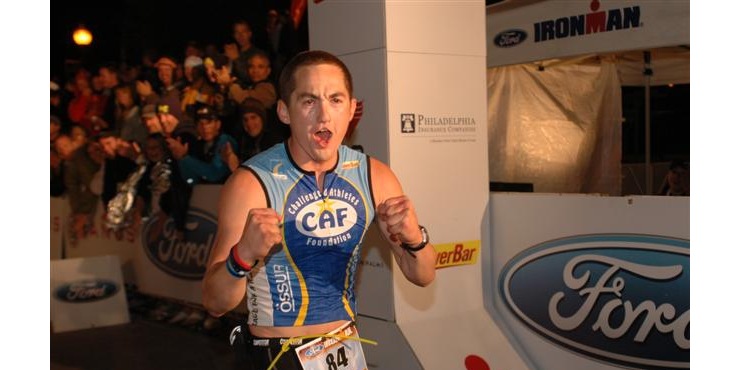
I'm not normally a sentimental human being, unless by "sentimental" you mean cynical, sarcastic, skeptical and curmudgeonly. When I hear the moniker "hero" conferred on a 6-year old who dialed 911 after he smelled smoke, my gag reflex kicks in. People and events worthy of our collective admiration are scarce in real life and it doesn't do us proud to keep inventing headlines out of thin air just because we're hungry for some positive news.
All of which makes me treasure those rare moments when something genuinely inspiring occurs, one that doesn't need all the machinery of a multi-billion dollar news manufacturing organization to "help us see" that it's important. Such an event took place last Sunday when a man named Rudy Garcia-Tolson crossed the finish line of Ironman Arizona with over fifty minutes left on the cutoff clock.
Rudy doesn't exist from the mid-thigh down. He ends at the same place Bermuda shorts do. He doesn't have most of the leg muscles that you and I use to walk, and he has virtually none of the ones we use to pedal a bicycle. And yet this double above-the-knee amputee managed to do something only a very small number of able-bodied people in the world can do. Following in the prosthetic footsteps of pioneers like Sarah Reinertsen and Scott Rigsby, he leaped (pun intended) over a chasm of impossibility, failed, leaped again and this time landed upright and triumphant on the other side, marking his place in history with all the thunder and consequence of a Lindbergh, Hillary or Yeager. From here on out, the rules governing the limits of challenged athleticism will need to be rewritten.
It wasn't easy, and very few among the frenzied crowd gathered at the finished line had any idea what Rudy had gone through to get there.
"Unfinished Business"
That's what Reinertsen, with one leg gone above the knee, called her first Ironman attempt at the World Championships in Kailua-Kona, Hawai'i, in 2004. She never got to the run because she missed the bike cutoff and her race was cut short. A year late she came back and tried again, this time leaving nearly two hours remaining on the clock when she arrived at the finish.
Scott Rigsby, the first double below-the-knee amputee to finish Ironman, also needed two tries to do it.
When Rudy didn't make the bike cutoff in Kona this past October, he realized that maybe there were some things in life his iron will couldn't push him through. He got smart in a hurry, but he didn't get any more patient: He signed up for Arizona, which was to take place a scant six weeks later, then went into training overdrive. The philosophical foundation of his workout regimen was simple: If he could just complete the bike segment under the cutoff, he'd have a lock on finishing the whole race. After all, he's a two-time Paralympic swimming gold medalist and a great runner to boot. So the primary emphasis in his training was to get him through the bike.
Turns out it wasn’t quite that simple, but nobody would know until about fourteen hours into the race.
Less than a minute before the starting cannon went off, the strap on Rudy’s goggles broke. There was no time to replace them so he tossed them away and did the whole swim without them. He had a little trouble navigating at first but it was a lot less chaotic than Kona and he handled it well. His goal had been fifty-nine minutes and he finished in 1:01, in 141st place out of over 2,400.
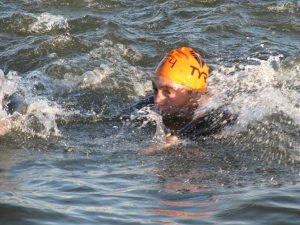
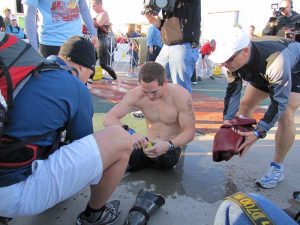
He gave back fifteen minutes, though, because the cold was worse than swimming without eye protection, and it took him nearly that long to warm up enough to leave T1.
The bike was as he expected it to be: Awful. Rudy can't stand up on the pedals and doesn't have a good way to relieve the inevitable strain on his lower back. Before he’d made the turnaround on the first of three loops, the pain had settled in and wouldn’t quit. While he was dealing with that he got a flat tire, with no tech support people anywhere in the vicinity. It turned out to be a good thing: Getting off the bike to change the tire himself took a while but all that moving around worked out the kinks in his back and the next half hour of pedaling felt better.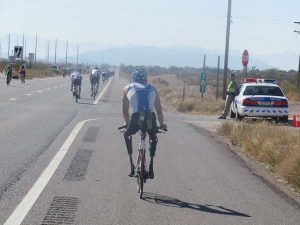
The second loop was much worse. The ache in his back kept increasing. Negative thoughts began to intrude and he started to worry about how much time he was taking. A headwind out on the Bee Line didn’t help, but a breeze at his back on the way down did. The third and final loop was smoother: Rudy hammered the last ninety minutes and things looked pretty rosy when he finally finished. It may not have been an especially pleasant eight hours and forty-five minutes, but he came into T2 with half an hour to spare and, as one observer put it, "looking like the weight of the world had just been lifted off his shoulders." The long-dreaded bike that had bested him in Kona was finally out of the way.
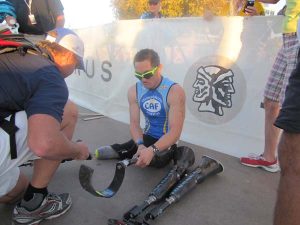
Back to Bataan
With a comfortable seven hours available to complete the 26.2-mile marathon, Rudy took his time in the changing tent knocking down a sandwich and some chips. He emerged at around 5:10 p.m., ready to attack the run like it was a mortal enemy, and passed more than a dozen startled runners before he'd gotten even 200 meters into the course. For the first short loop of 3.5 miles he averaged 9:15 per mile, a great pace for an Ironman amateur, a blistering one for a double amputee. Uncertainty among spectators regarding his ability to finish began to give way to wild speculation about his likely time across the line.
The second segment of 8.6 miles didn't go as well. He slowed toward the end, began walking periodically, took the occasional stretch but, after all, he’d known it was going to be long and painful, so there wasn’t anything surprising going on. The guy had practically killed himself getting through the bike and a toll was taken. Besides, he had well over five hours remaining to the 17-hour cutoff and, as he himself had put it, "Once off the bike I could probably walk twenty-six miles and still get there in time." Average pace for that segment: 13:24
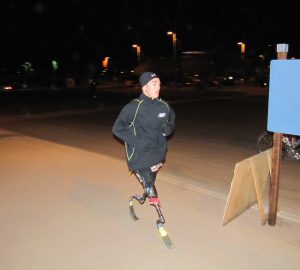
By segment three the wheels were coming off. It was more walking than running now, and neither of them looked good. While Rudy can vary his stride length, his tempo tends to remain constant because he needs to swing his legs in a wide arc in order to bring his back foot forward. If he can't maintain that tempo, he can't run, and transitioning from walk to run involves a serious decision about whether he has the strength to get his legs swinging. If his form breaks down, one leg or the other doesn't go wide enough and he has to lean to compensate. All that leaning strains his back, which saps his strength, which compromises his form, which strains his back…the vicious cycle is hard to break.
At Mile 18.5 he got his second massage of the night from the "Cramp 911" guys at the Priest Avenue aid station. After removing his legs he had his lower back worked on and his stumps rubbed down. Ten minutes later he hit the street like a man reborn, jaunty and rejuvenated.
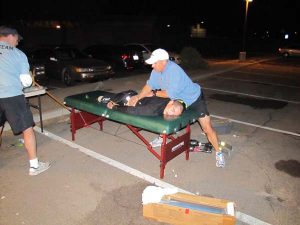
It lasted about a quarter of a mile. He began stopping completely, lying down on the ground, sometimes trying to bend his torso to relieve the strain in his back, sometimes just staring up at the sky and not moving at all. He'd gone glassy-eyed and uncommunicative; where earlier he'd flashed smiles and engaged in bits of banter with fellow competitors, he now seemed enclosed in a shell, lost in himself and unwilling or uninterested in engaging with the rest of the world. His average pace for the segment was 16:25 and at one point it had taken him over half an hour to cover a mile. By mile twenty-two he was in a deep hole, a strange and alien place he'd never experienced before, and nobody who saw him thought he had a prayer of even taking himself off the course under his own power, much less finishing the race.
He felt himself slipping, the urge to stay down and fall asleep almost overwhelming. He couldn’t even have told you where it hurt, because the pain was everywhere, but even that wasn’t as bad as the doubt. Rudy had never run a marathon before, and while he’d had every confidence that he could, he really didn’t know for sure. Maybe trying his first one at the tail end of a 2.4-mile swim and a 112-mile bike ride hadn’t been the smartest idea. What if it was flat out impossible and he just didn’t know it? How much was he going to hurt himself only to discover it had all been for nothing?
He pulled off his legs and then yanked the liners off his stumps to let them air out. He massaged what remained of his legs, hard, trying to work out the knots and soreness. Negativity assaulted him but there was one thought he kept pushing aside, and that was the thought of quitting. It was literally unthinkable. His mind skipped around to the thousands of people who’d shouted "Go, Rudy!" over the past fifteen hours. There hadn’t been a spectator or fellow competitor who didn’t know who he was and hadn’t done something – a shout, a wave, an extended hand hoping for a high five— to let him know they were on his side and pulling for him. Exhausted athletes on the third loop of the run had expended precious and dwindling breath to call out encouragement. Each had been a jolt of adrenaline for him, and the idea of wasting those expressions of good will and hope was more than he could bear.
Now, down on the ground, even through the haze enveloping his mind he could sense the uncertainty in their voices as they passed in the dark. Were they wondering if he’d already quit?
He hadn’t. Not even close. That he was going to make the cutoff wasn’t up for negotiation; the only issue was how.
He looked at his watch: 10:30. He had ninety minutes to cover four miles. It was going to hurt like hell no matter what, but if he could run the entire distance instead of periodically walking or dropping to the ground, he could get it done sooner.
A call came in from the cast of coaches waiting at the finish to the cyclists hovering behind and in front of Rudy. "At the next aid station, make him drink two cups of broth, and two at every aid station after that." If he makes it to the next aid station, was the thought out on the course.
Rudy was unaware any of that was going on. Something had just occurred to him. After all he’d been through and accomplished, after all the testing and triumph, he’d never really answered one question that lay at the heart of his lifelong odyssey: What am I really made of?
He decided it was time to find out. He pulled on his liners and legs, picked himself up off the ground and began running. To those who had been following him it looked like just another in a series of seemingly futile attempts to regain his rhythm and try to get something going. There was no way he could last even fifty meters at that pace.
Fifty meters later he speeded up, and only slowed down to knock back the prescribed two cups of broth at the Mile 23 aid station. As soon as he tossed the empty cups he began running again, just in time to confront a long uphill, a vicious pull that was sure to dispirit him and send him back to the pavement.
As soon as he hit the hill he speeded up again. Surely he was going to burn himself out, maybe even put himself into a coma. He stopped at Station 24 for some more broth and a little food, then hit the path along the river. The thwk-thwk of his carbon-fiber feet on the sandy cement had the same metronomic steadiness of his earlier running but his stride length was the same as when he'd exited the changing tent over 5-1/2 hours earlier. He was hurtling along the river, his eyes gone from glassy to glistening, heedless of the disaster that would occur if one of those feet hit an errant rock or a crack in the pavement at that speed.
He didn’t care. He was determined not to come stumbling across the finish line at the last possible second. He wasn’t just out to make history, he was out to represent, and finishing strong didn’t mean a 50-meter burst at the end, it meant three more miles of serious, nonstop, high speed running. He had a statement to make and there was only one way to do it.
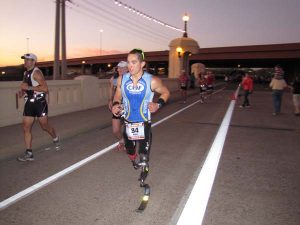
Having made up his mind, the fog began to clear and he settled into the groove that had been eluding him. At the short but very steep uphill leading to the Rural Street Bridge. Rudy powered up as though riding a T-bar on a ski mountain. By the time he got onto the bridge he was hitting sub-9-minute miles and shot past the last aid station without grabbing so much as a cup of water. He didn't slow down until he'd run into the solid wall of photographers waiting on the other side of the finish line, sixteen hours, six minutes and twenty-seven seconds after he'd begun the race.
It was a performance that was as puzzling as it was stunning. Rudy had a lot at stake, and his courage and fierce determination are undeniable, so it wouldn't have surprised anyone had he roused himself past the pain in his stumps, the ache in his back and the fatigue clouding his mind and dragged himself those last few miles toward a final stagger across the line. That would have been historic, and heartwarming. It would have been understandable. Even a last minute, all-out effort to run the last forty or fifty meters, adrenalized by the cheering crowd, would have been well within athletic precedent.
But where did over three miles of power and speed come from? He'd spent a good chunk of the final run segment flat on his back yet still managed to average 13:45 per mile.
It didn't make any sense, and Rudy wasn't saying. He might have ascended from the abyss but during those last few miles he hadn't spoken to anybody. He'd found a zone and maybe it was so delicate and tenuous he wasn't willing to risk breaking its spell so he tuned out everything and just kept going.
It's a certainty his mind was clear. A block before the finish he peeled off two layers of pullovers so that the Challenged Athletes Foundation logo on his shirt would be visible as he entered the finishing area. He smiled for the first time in hours as soon as he crossed, and gave a lucid interview to race announcer Mike Reilly, who had no idea what Rudy had been through and found no evidence in his demeanor to indicate that the day had been anything but a lark, another in an inexorable series of towering and inspirational accomplishments.
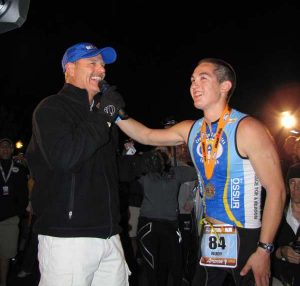
By Tuesday Rudy was still aching everywhere and had developed a case of pinkeye from the ungoggled swim. As he mentally replayed the experience, he found most of his thoughts centered around the support he’d received and the effect it had had on letting him become the first "double above" to complete an Ironman. Coaches, family, friends, the Challenged Athletes Foundation, untold numbers of spectators and fellow competitors along the course...if there was a way for him to thank each of them personally, he would. But at this moment he had to force himself to refocus: The next morning he was heading down to Rio de Janeiro to compete in the world short course swimming championships.
I don't know exactly what to make of what I witnessed, or how to sum it up except for this: A man was born last Sunday and I'm through referring to Rudy as a "kid."
